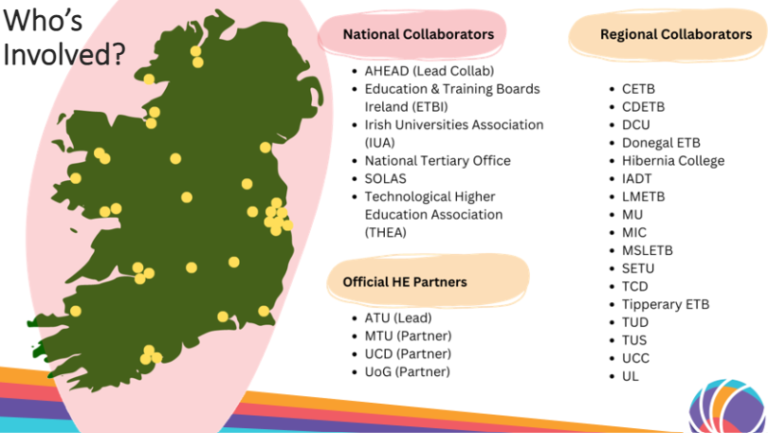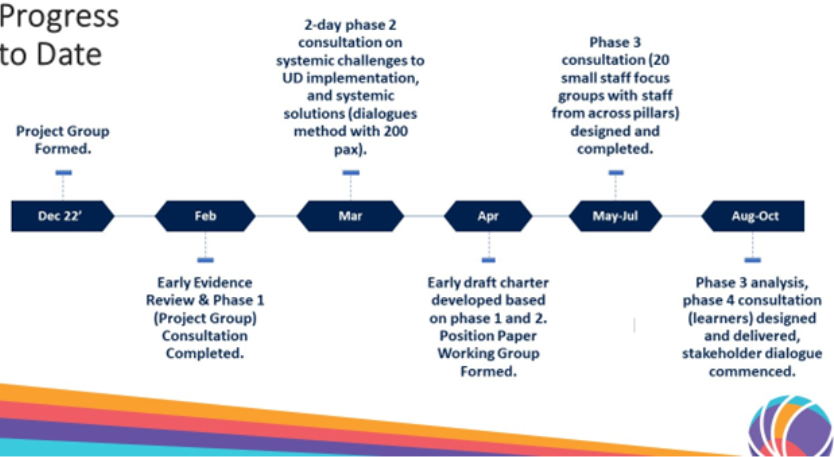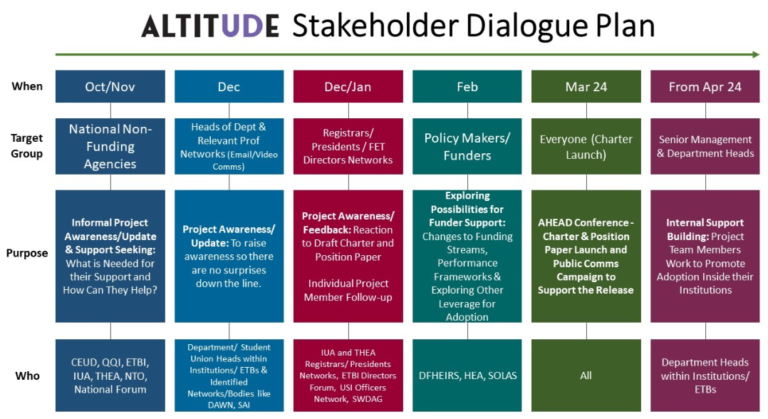Home » Administration » Academic Affairs and Registrar » UDL » UD Charter and PATH 4 Information
ALTITUDE: The National Charter for Universal Design in Tertiary Education

The Altitude Charter
The Altitude Charter is a vehicle for your institution to declare its intent to make incremental and sustainable progress towards embedding a universal design approach – embedded in this document.
Technical Report
Technical Report is outlining the context for the development of the Charter, the evidence base that underpins it, the alignment of the Charter with legislation and policy, and recommendations on its implementation.
What is the ALTITUDE CHARTER?
Find out in this short video.
Express your interest in joining the ALTITUDE community here.
About the ALTITUDE Charter
The learner population in tertiary education is becoming increasingly diverse, and students’ lives are also increasingly complex. The responsibility on educational institutions to provide equitable access for all is now strongly embedded in Irish legislation, and national tertiary education strategies contain more specific goals to implement a Universal Design approach, (SOLAS, 2020; Higher Education Authority, 2022).
The aim is to move towards a system where ‘Inclusion is Everyone’s Business’, where all staff play their part in delivering an inclusive educational experience.
Universal Design, or UD for short, offers us an evidence-based approach to engender this mindset, and is increasingly seen as a central tenet of our response to rising diversity, (Centre for Excellence in Universal Design, 2022). But how can we embed a UD approach in our institutions?
That’s where ALTITUDE – the National Charter for Universal Design in Tertiary Education – comes in to play.
Funded by the HEA under PATH 4, the ALTITUDE Project is an extensive cross sectoral collaboration involving six national agencies, fifteen higher education (HE) institutions and six Education and Training Board (ETB) representatives, nominated by Directors of FET to represent the Further Education and Training sector.
The vision of the project looks to a future in tertiary education where ‘all learners are transformatively included through universal design in education’, deriving the name ALTITUDE. It seeks to move us in that direction by supporting HEIs and ETBs to make sustainable progress towards systemically embedding a UD approach…. – one which places human diversity at the heart of tertiary education design, and fosters student success for all learners.
The ALTITUDE Charter, and the associated toolkit and technical report, build on significant existing work on UD in the Irish tertiary education landscape (Kelly & Padden, 2018), and through these outputs, provides a clear roadmap for institutions to make progress.
Drawing from national and international literature, the Charter recommends key strategic enablers, which institutions should put in place over time to support the sustainable implementation of UD, and proposes collaborative action to work towards goals under 4 key pillars of our institutions:
- Learning, Teaching & Assessment;
- Supports, Services & Social Engagement;
- the Physical Environment;
- and the Digital Environment
Institutions who adopt it will over time benefit from:
- a more unified language of and commitment to a universal design approach in their institution
- a greater culture of shared responsibility for UD, access, and inclusion, operationalising the ‘Inclusion is Everyone’s Business’ mindset.
- a more effective and learner centred approach to compliance with national legislation and policy.
- and most importantly, the iterative development of programmes, services, and environments that enable equitable opportunities for all learners to thrive and be successful.
The cross-sectoral development of the ALTITUDE Charter represents a landmark moment for the tertiary education sector, signalling its intent to place human diversity at the heart of its design and delivery.
Context
Ireland’s education system is at a critical stage in its development. Greater diversity in the student population, a national and international policy emphasis on the right to an inclusive education for every learner, and the evolution of technology in education in recent decades, have drawn attention to the need for a more inclusive model of education across all sectors, and more inclusive educational environments. There is a growing momentum towards an inclusive, and unified tertiary education sector in both policy and practice. A universal design approach is increasingly seen as central tenet of our response to ensuring all learners are included in the design and delivery of tertiary education, (Centre for Excellence in Universal Design, 2022).
Research has shown that Ireland has a robust national policy commitment to a universal design approach, and evidence of engagement of individuals in professional development and local implementation is plentiful. Universal Design is also uniquely defined in Irish law, accompanying a suite of legislative commitments concerning equity of access and accessibility. The ongoing review of Irish equality legislation and the forthcoming European Accessibility Act will further strengthen this legislative framework.
Despite these developments, however, evidence also shows that a commitment to universal design is not as evident in the institutional strategies and policies of higher education institutions and education and training boards (Healy et al., 2023). This represents a threat to the sustainability of the approach and raises concerns about how well-supported a universal design approach is within tertiary institutions.
It is within this context that calls for the development of a National Charter for Universal Design in Tertiary Education have arisen.
“Universal design” is defined as the design of products, environments, programmes, and services to be usable by all people, to the greatest extent possible, without the need for adaptation or specialized design, (United Nations, 2006).
The 7 principles of Universal Design, (National Disability Authority, 2020), are more commonly associated with three domains: the built environment, products and services, and information and communications technologies (ICT). The literature on Universal Design in Education (UDE) helps us to take a whole systems approach to the application of universal design in educational contexts (Burgstahler, 2009), by incorporating relevant pedagogical frameworks. The internationally recognised and evidence-based Universal Design for Learning (UDL) framework (CAST, 2018) contributes significantly to this approach.
The ALTITUDE Charter builds on significant existing work on UDE in the Irish landscape (Kelly and Padden, 2018), providing a clear roadmap for tertiary institutions to make sustainable progress towards systemically embedding a universal design approach.
Who’s Involved in Developing the Charter?

Project Outputs & Aims
The project intends to produce three key outputs:
- Develop the ALTITUDE Charter (Estimated release March 2024), launching a national discussion on why it should be adopted and how it can be supported.
- Produce a Position Paper outlining charter development & featuring proposals on how it may be adopted and utilised in the system (Estimated release March 2024).
- Adapt and update the Toolkit for Inclusive Higher Education Institutions (Kelly and Padden, 2018) to support self-assessment and practical implementation of the ALTITUDE Charter by HEIs and ETBs (Estimated release Winter 2024) across the tertiary sector.
The ALTITUDE Charter will provide a roadmap for the systemic implementation of universal design and related frameworks across tertiary education, and act as a vehicle for institutional commitment to this approach. The working draft vision and mission of the ALTITUDE Charter are as follows:
Project Vision (Working Draft)
“Tertiary education institutions where All Learners are Transformatively Included Through Universal Design in Education.” (Deriving the acronym ALTITUDE)
Project Mission (Working Draft)
“To support HEIs and ETBs to make sustainable progress towards systemically embedding a universal design approach, which places human diversity at the heart of tertiary education design and fosters student success for all.”
How This Charter Can Help Your Institution
Adopting the Charter will:
- Provide a vehicle for your institution to declare its intent to make incremental and sustainable progress towards embedding a universal design approach, in line with its resources, culture and strategy.
- Promote the development of policies, structures, and strategies in your institution which support the sustainable implementation of a universal design approach.
- Anchor a culture of shared responsibility for universal design, access & inclusion in your institution by supporting development of organisational structures which foster an ‘everyone’s business’ approach to inclusion.
- Develop a more unified language of and commitment to a universal design approach in your institution, fostering greater opportunities for partnership, collaboration, and shared learning.
- Support your institution to comply with Irish law and work towards goals in a range of key national and international strategies concerning universal design, accessibility, student success, sustainability, and inclusion.
What will it mean for institutions to adopt the Charter?
Adopting the charter will be a declaration of positive intent to make incremental and sustainable progress towards embedding a universal design approach in the systems and practices of the institution.
The Charter recognises that different institutions are at different stages of UD adoption, and have differing levels of available resources, and encourages institutions to make steady progress in line with their strategy, culture, and values.
It will commit institutions to developing an institutional committee which plans and oversees incremental and sustainable progress in systemic implementation of universal design (UD) across the 4 pillars, in line with the actions contained in the Charter.
Progress to Date
The development of the ALTITUDE is informed by both international literature concerning universal design in educational contexts, and widespread consultation with staff and learners in Irish tertiary education. Drawing from the literature, the Charter will recommend key strategic foundations and scaffolding which institutions should put in place to support sustainable implementation of UD across the learner experience and propose collaborative action under 4 key pillars.


Completed consultation on the development of the Charter to date includes:
- Phase 1: Internal consultation with the 50+-member expert group (Dec 22-Feb 24).
- Phase 2: A 2-day national consultation event built into the AHEAD conference featuring 200+ students and professionals from FET and Higher Education (Mar). Following phase 1 and 2, an early draft of the charter was developed to inform the next phase of consultation.
- Phase 3: 20 focus group staff consultations facilitated locally in ETBs and HEIs around the country by project team members, providing direct feedback on the draft Charter (May to July).
- Phase 4: 15 learner focus groups and approx. 1350 learner survey responses providing direct input from FET and HE students on what would make their experience more inclusive and accessible in each pillar.
At each phase, the project team is analysing the data returning from consultation exercises and incorporating key themes emerging in the development of the next draft of the Charter, and where relevant, the underpinning toolkit.
The underpinning toolkit in development to support practical implementation of the Charter, will build on the existing Toolkit for Inclusive Higher Education Institutions (Kelly & Padden, 2018), updating it to give it a broader tertiary focus and close alignment with the Charter. The toolkit will provide practical guidance and tools for self-assessment, aligned with relevant, evidence-based frameworks, standards, and resources.
Esteemed researcher in the field of Inclusive Education Dr Joanne Banks is engaging with a working group of the project to develop a position paper which outlines the development of the charter, surfaces the evidence base for UD and the underpinning frameworks, and makes recommendations for how the sector can support and adopt the Charter at national and Institutional levels. Dr Banks has worked with the group throughout the summer and autumn on developing multiple drafts of the paper. This process is due to be completed and brought back to the main project group for approval in January.
The significant progress to date has been facilitated by an extraordinary collaborative effort from the cross-sectoral team, and the distribution of workload and responsibility to 10 different working groups at different stages of the project to date.
The Stakeholder Dialogue Team are currently meeting with key national stakeholders across the system to brief them on the project, canvas for their support of the project, and seek consensus on what support is needed for the Charter to be widely adopted and implemented by institutions.
Next Steps
The next phases of the project are:
- Phase 4 learner consultation analysis (15 focus groups and approx. 1350 survey responses).
- Continue Phase 5 Consultation: Stakeholder Dialogue with Funders, National Agencies and National Representative Groups (In progress – Oct – Jan).
- Development of final draft of the Charter and Position Paper, considering the findings of phase 4 and 5 consultation in updates made.
- Launch of the Charter and Position Paper as a national discussion in March 2024, with the toolkit following later in the year. These releases are intended to give institutions an early look at the Charter and encourage internal dialogue to consider formal adoption and implementation.
- Given the need for deeper dialogue with representative groups and policy makers, it is estimated that adoption of the Charter will formally become available later in 2024/early 2025.
- Release by UCD of a toolkit for inclusive tertiary education institutions to which will align with, and support implementation of the ALTITUDE Charter (date TBC).
The extensive stakeholder dialog process underway will seek to raise further awareness of the project, seek the support of key stakeholders, and explore challenges and enablers to the adoption of the Charter.

During the Stakeholder Dialogue Phase, the team will also seek to make progress on/resolve the following key questions:
- What support can be provided by policy makers, funders, and national quality bodies to leverage and encourage adoption of the Charter, and support its implementation? Examples brainstormed by the project team include the inclusion of new criteria in overarching funding requirements and existing fundings streams, the introduction of a new funding stream to support setup of institutional structures for sustainable implementation of the Charter, and the inclusion of clear UD criteria spanning the 4 pillars of the ALTITUDE Charter in national quality processes and guidelines.
- Which stakeholders may be willing to support collaborative development of future events and communities of practice to encourage ongoing cross-sectoral collaboration and knowledge-sharing? Examples brainstormed by the project team include development of national communities of practice of staff working under individual pillars, and the shared hosting by representative bodies of an annual or biennial ALTITUDE Congress for tertiary institutions to come together and share progress on Charter implementation.
Currently, the project group hope to release version 1 of the Charter and the associated position paper in March 2024.
Further Resources
Learn more about the Charter Project.
View the existing Toolkit for Inclusive Higher Education Institutions (Kelly and Padden, 2018) which this project will update to align with ALTITUDE and widen to a tertiary education focus.
Universal Design: All Things to All People? Creating Collective Agency through Stakeholder Dialogue – Read a Journal Article on the outcomes of the large-scale Phase 2 consultation exploring barriers and enablers to universal design implementation.
References
Burgstahler, S. (2009). Universal Design in Education: Principles and Applications. DO-IT.
Centre for Excellence in Universal Design. (2022). Universal Design in Education and Training – policy Landscape in Ireland. Retrieved 07/11/2023 from https://universaldesign.ie/education/third-level-education
CAST (2018). Universal design for learning guidelines version 2.2 [graphic organizer]. Wakefield, MA: Author. https://udlguidelines.cast.org/more/downloads
Kelly, A., & Padden, L. (2018). University for All: Toolkit for Inclusive Higher Education Institutions-From Vision to Practice. UCD. https://www.ucd.ie/universityforall/resourcehub/toolkit/
Healy, R., Ryder, D., & Banks, J. (2023). Universal Design for Learning Policy in Tertiary Education in Ireland: Are we Ready to Commit? In L. Dukes & J. Madeus. (Eds.), Handbook on Higher Education and Disability. Elgar Publishing.
National Disability Authority. (2020). Centre for Excellence in Universal Design. What is Universal Design: The 7 Principals. Retrieved 14/04/23 from https://universaldesign.ie/What-is-Universal-Design/The-7-Principles/?fbclid=IwAR0z2WOIwL5dmh7fNHVsJXcOnSb9gwYd7HeUo2vPV0YnhRZ9pWm3vbhxyeY
United Nations. (2006). Convention on the Rights of Persons with Disabilities (CRPD). Retrieved 14/04/23 from https://social.desa.un.org/issues/disability/crpd/convention-on-the-rights-of-persons-with-disabilities-crpd
